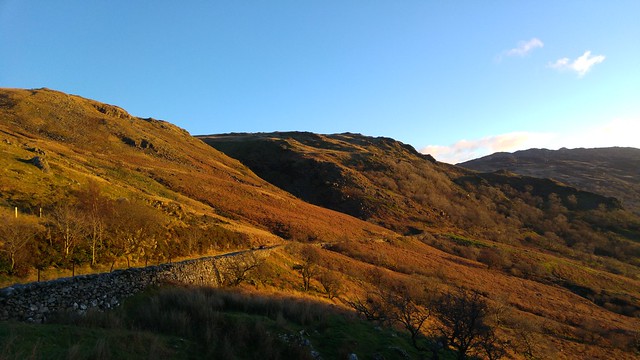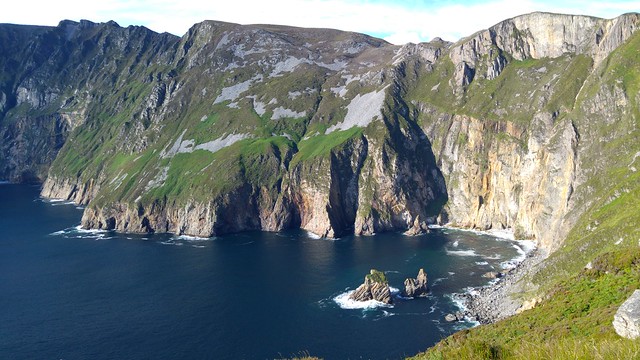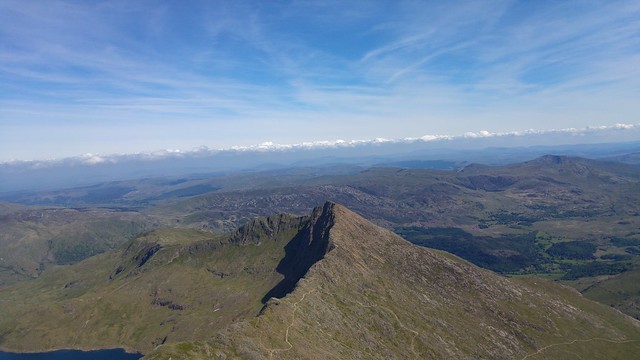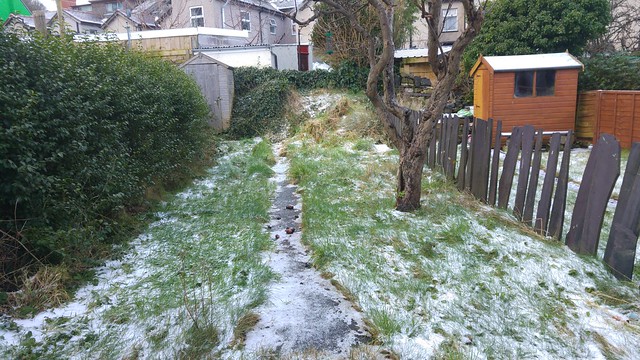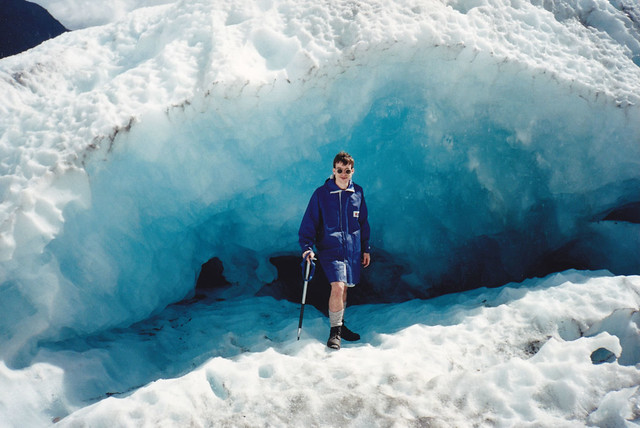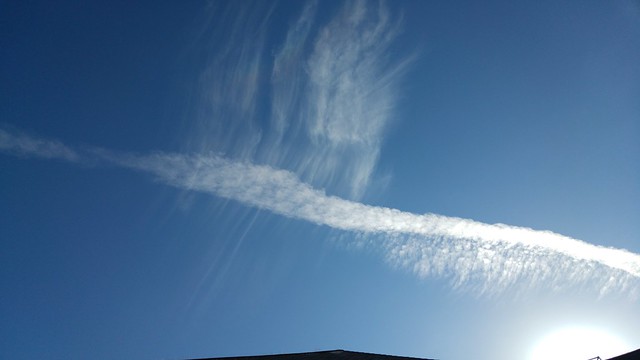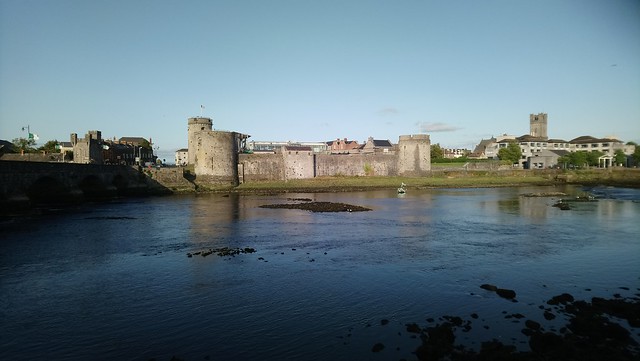Words for water and related words in Celtic languages.

Words marked with a * are reconstructions.
| Proto-Celtic |
*dubros = water, dark
*dubrokū = otter (“water dog”)
*dubro-jarā = water-hen |
| Gaulish |
Dubra, Uerno-dubrum = names of rivers |
| Old Irish (Goídelc) |
dobur [ˈdovur] = water, river
doburchú [ˈdovurˌxuː] = otter (“water dog”) |
| Middle Irish (Gaoidhealg) |
dobrán = water |
| Irish (Gaeilge) |
dobhar = water; flood, torrent; darkness, dullness, obscurity
dobhartha = watery, wet; dull, gloomy.
dobharchú = otter (“water dog”)
dobharchlog = water clock
dobhardhroim = watershed
dobhareach = hippopotamus
dobharlí = water-colour
dobhrán = otter; dull-witted, stupid, person |
| Scottish Gaelic (Gàidhlig) |
dobhar [do.ər] = water (archaic)
dobhar-chù [do.ərxu] = otter, beaver (“water dog”)
dobhar-lus [r̪ˠɔːhdəx] = (water)cress
dòbhran [dɔːran] = otter |
| Manx (Gaelg) |
dooarchoo = otter, beaver (“water dog”)
doour = reservoir, dam |
| Proto-Brythonic |
*duβr = water
*düβrgi = otter |
| Middle Welsh (Kymraec) |
dwfyr [ˈduvər] = water |
| Welsh (Cymraeg) |
dŵr [duːr], dwfr [dʊvr] = water; urine; pus
dyfrgi, dwrgi = otter (“water dog”)
dyfrgiad = watering, irrigation, urination
dyfrio, dyfru = to water, to irrigate, to run, to urinate
dyfrig = dripping, foaming (of a horse)
dyfraidd = aqueous, waterish, aquatic |
| Cornish (Kernewek) |
dowr [doʊɹ] = water; river
dowrgi = otter (“water dog”)
dowra = to water
dowrhe = to irrigate
dowrvagh = hippopotamus
dowrliw = water-colour |
| Middle Breton |
dour = water |
| Breton (Brezhoneg) |
dour [ˈduːr] = water; rain, tears, sweat, saliva
dourgi = otter (“water dog”)
douraerouant = hydra
dourliv, dourlivadur = water-colour
dournijerez = seaplane, flying boat, hydroplane |
Etymology: from the Proto-Indo-European *dʰubrós (dark) from *dʰewb- (deep). The River Douro in Portugual, which is called the Duero in Spain, gets its names from the same Proto-Celtic root, via the Latin Dūrius. The River Dubra in Galicia in the northwest of Spain also gets its name from Proto-Celtic *dubros, as does the English town Dover, and French towns such as Douvres-la-Délivrande in the department of Calvados in Normandy, and Douvres in the department of Ain in the Auvergne-Rhône-Alpes region [source].
Words from the same PIE roots include deep, dip, dope and possibly abyss in English, dubra (puddle) in Latvian, debra (gorge, ravine) in Slovak, debrza (dell, dingle) in Polish, and döpa (to baptize, name, christen) in Swedish [source].
| Proto-Celtic |
*udenskyos = water |
| Old Irish (Goídelc) |
uisce [ˈusʲkʲe] = water |
| Irish (Gaeilge) |
uisce [ˈɪʃk̟ɪ] = water; rain, tears, saliva
uisceadán = aquarium
uiscebhealach = waterway
uiscedhath = watercolour
uiscedhíonach = waterproof
uisce-obach = watertight
uiscerian = aqueduct
uiscigh = to water, irrigate
uisciú = irrigation
uisce beatha = (Irish) whiskey |
| Scottish Gaelic (Gàidhlig) |
uisge [ɯʃgʲə] = water; rain; river (in place names)
uisgeadan [ɯʃgʲədan] = aquarium; body of water
uisge-dhath, dath-uisge = watercolour
uisge-dhìonach = waterproof, impervious; watertight
uisgrian = aqueduct
fuar-uisge = cold rain, cold water
slighe-uisge = waterway
uisgich [ɯʃgʲɪç] = to water, irrigate
uisgeachadh [ɯʃgʲəxəɣ] = watering, irrigation
uisge-beatha = (Scottish) whisky |
|
| Manx (Gaelg) |
ushtey [ˈuʃtʲə] = water
ushteydane = aquarium
bollagh ushtey, coorse ushtey, raad ushtey = waterway
ammyr ushtey, droghad ushtey = aqueduct
ushtaghey = to water, irrigate, steep, watering irrigation
ushtey bea = whisk(e)y |
Etymology from the Proto-Indo-European *udén, from *wódr̥ (water). The English word whiskey comes from Irish uisce beatha (whiskey), and whisky comes from Scottish Gaelic uisge-beatha (whisky): the former is used in Ireland, England and the USA, while the latter is used in Scotland, Canada and Australia [source].
Words from the same PIE root include water, undulation, inundation and vodka in English, Wasser (water) in German, onda (wave) in Spanish, vanduõ (water, current, flow) in Lithuanian, and woda (water, flood) in Polish [source].

| Proto-Celtic |
*sālos = saltwater
*saleinos = salt |
| Old Irish (Goídelc) |
sál [saːl], sáile [ˈsaːlʲe] = salt water, brine, seawater; sea, ocean (poetic) |
| Middle Irish (Gaoidhealg) |
sál, sal, sāil = the sea, ocean, seawater, brine |
| Irish (Gaeilge) |
sáile [ˈsˠɑːlʲə] = sea water, sea, salt water, brine
loch sáile = sea-water loch, lagoon
thar sáile = overseas |
| Scottish Gaelic (Gàidhlig) |
sàl, sàile = the sea, sea water, salt water |
| Manx (Gaelg) |
sailley = salt water |
| Proto-Brythonic |
*salī = salt, sea water |
| Middle Welsh (Kymraec) |
hely, heli = brine, salt water, pickle, sea-water, sea |
| Welsh (Cymraeg) |
hâl [haːl] = salt, salty, saline, akaline
heli = brine, salt water, pickle, sea-water, sea
helïad = a salting, seasoning
helïo = to salt, preserve, pickle, season
helïaidd = salty, briny, saline, brackish |
| Middle Cornish (Cernewec) |
hyly = brine, salt water, sea water |
| Cornish (Kernewek) |
hyli = salt water |
| Middle Breton (Brezonec) |
hili, hyli = brine |
| Breton (Brezhoneg) |
hal = salt water, salt
hili = brine, strong sauce |
Etymology from the Proto-Indo-European *séh₂ls (salt) [source]. Words from the same PIE root include salt, saline (containing salt, salty) and salad in English, sel (salt) in French, sal (salt) in Spanish, sůl (salt) in Czech, and suola (salt) in Finnish [source].
| Scottish Gaelic (Gàidhlig) |
bùrn [buːr̪ˠn̪ˠ] = (fresh) water, amount of water, (act of) raining
bùrn-éirigh = spring water
bùrn-iarainn = mineral water
bùrn mìn = fine drizzle |
Etymology from the Scots burn (a small river), from the Middle English bourne (small stream), from the Old English burne, burna (spring, fountain), from Proto-Germanic *brunnô (stream, brook). the Proto-Indo-European *bʰrun- (a bubbling forth; a fountain, wellspring, source) [source].

Sources: Wiktionary, Etymological Dictionary Of Proto Celtic, In Dúil Bélrai English – Old Irish glossary, eDIL – Electronic Dictionary of the Irish Language, Teanglann.ie, Am Faclair Beag, An etymological dictionary of the Gaelic language, Fockleyreen: Manx – English Dictionary, Online Manx Dictionary, Gaelg Corpus, Geiriadur Prifysgol Cymru, Lexicon cornu-britannicum : a dictionary of the ancient Celtic language of Cornwall, Gerlyver Kernewek, Devri : Le dictionaire diachronique du breton, Dictionaire Favereau, TermOfis
